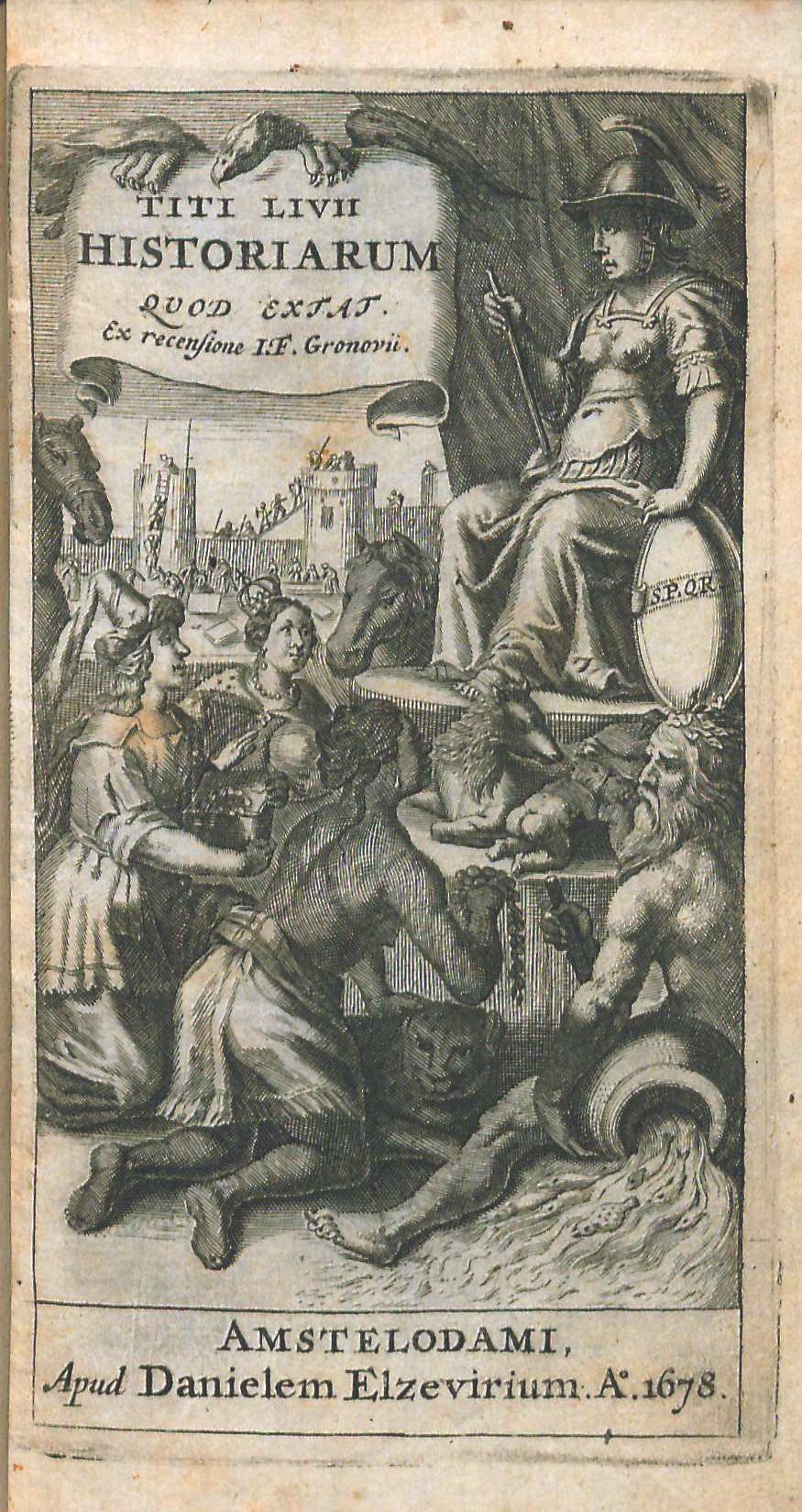Difference between revisions of "Titi Livii Historiarum Quod Extat"
(fn edits) |
|||
| Line 14: | Line 14: | ||
|pages=[2], 788 | |pages=[2], 788 | ||
|desc=12 mo (16 cm.) | |desc=12 mo (16 cm.) | ||
| − | }}[http://en.wikipedia.org/wiki/Livy Titus Livius] (59 BCE–17 CE) was a Roman historian from [http://en.wikipedia.org/wiki/Padua Patavium], the wealthiest town in northern Italy. His original work ''Books from the Foundation of the City'' covered Roman history from the founding to 9 BCE in 142 books. Only 35 of those books still survive today, yet they show that Livy wrote as an orator rather than a historian. He had an embellished style and made few references besides those to literary sources.<ref>John Roberts, ed. "[http://www.oxfordreference.com/view/10.1093/acref/9780192801463.001.0001/acref-9780192801463-e-1297 Livy]" in ''Oxford Dictionary of the Classical World'' (Oxford: Oxford University Press, 2007).</ref> His embellishments and additions create an atmosphere which makes the reader a part of the specific topic’s experience. “His aim was to chronicle the rise of Rome to mastery first of Italy, then of the rest of the Mediterranean world, and to highlight the virtues which produced this result and enabled Rome to defeat Hannibal.”<ref>Ibid.</ref><br/> | + | }}[http://en.wikipedia.org/wiki/Livy Titus Livius] (59 BCE–17 CE) was a Roman historian from [http://en.wikipedia.org/wiki/Padua Patavium], the wealthiest town in northern Italy. His original work ''Books from the Foundation of the City'' covered Roman history from the founding to 9 BCE in 142 books. Only 35 of those books still survive today, yet they show that Livy wrote as an orator rather than a historian. He had an embellished style and made few references besides those to literary sources.<ref>John Roberts, ed. "[http://www.oxfordreference.com/view/10.1093/acref/9780192801463.001.0001/acref-9780192801463-e-1297 Livy]," in ''Oxford Dictionary of the Classical World'' (Oxford: Oxford University Press, 2007).</ref> His embellishments and additions create an atmosphere which makes the reader a part of the specific topic’s experience. “His aim was to chronicle the rise of Rome to mastery first of Italy, then of the rest of the Mediterranean world, and to highlight the virtues which produced this result and enabled Rome to defeat Hannibal.”<ref>Ibid.</ref><br/> |
[[File:TitiLiviiHistoriarumQuodExtat1678Headpiece.jpg|left|thumb|350px|<center>Headpiece, first page of text.</center>]]''Titi Livii Historiarum Quod Extat'' contains, in the original Latin, the still existing portions of Livy's historical work. | [[File:TitiLiviiHistoriarumQuodExtat1678Headpiece.jpg|left|thumb|350px|<center>Headpiece, first page of text.</center>]]''Titi Livii Historiarum Quod Extat'' contains, in the original Latin, the still existing portions of Livy's historical work. | ||
Revision as of 08:43, 28 April 2014
by Livy
| Titi Livii Historiarum Quod Extat | |
|
Title page from Titi Livii Historiarum Quod Extat, George Wythe Collection, Wolf Law Library, College of William & Mary. | |
| Author | Livy |
| Editor | Joannes Fredericus Gronovius |
| Published | Amstelodami: Apud D. Elzevirium |
| Date | 1678 |
| Language | Latin |
| Pages | [2], 788 |
| Desc. | 12 mo (16 cm.) |
Titus Livius (59 BCE–17 CE) was a Roman historian from Patavium, the wealthiest town in northern Italy. His original work Books from the Foundation of the City covered Roman history from the founding to 9 BCE in 142 books. Only 35 of those books still survive today, yet they show that Livy wrote as an orator rather than a historian. He had an embellished style and made few references besides those to literary sources.[1] His embellishments and additions create an atmosphere which makes the reader a part of the specific topic’s experience. “His aim was to chronicle the rise of Rome to mastery first of Italy, then of the rest of the Mediterranean world, and to highlight the virtues which produced this result and enabled Rome to defeat Hannibal.”[2]
Evidence for Inclusion in Wythe's Library
Listed in the Jefferson Inventory of Wythe's Library as Livius. p. f. and given by Thomas Jefferson to his grandson Thomas Jefferson Randolph. The precise edition owned by Wythe is unknown. George Wythe's Library[3] on LibraryThing indicates as much and suggests no specific edition. The Brown Bibliography[4] lists the 1678 Amsterdam edition based on a copy of this edition owned by Jefferson (but not sold to the Library of Congress). The Wolf Law Library followed Brown's suggestion and purchased the 1678 Elzevir edition edited by J.F. Gronovius.
Description of the Wolf Law Library's copy
Bound in dark green Jansenist morocco with gilt edges. Purchased from Hundersdorff Rare Books.
View this book in William & Mary's online catalog.
References
- ↑ John Roberts, ed. "Livy," in Oxford Dictionary of the Classical World (Oxford: Oxford University Press, 2007).
- ↑ Ibid.
- ↑ LibraryThing, s.v. "Member: George Wythe," accessed on April 21, 2013.
- ↑ Bennie Brown, "The Library of George Wythe of Williamsburg and Richmond," (unpublished manuscript, May, 2012) Microsoft Word file. Earlier edition available at: https://digitalarchive.wm.edu/handle/10288/13433.
External Links
Read this book in Google Books.

